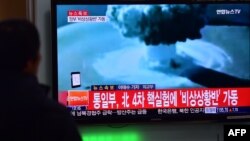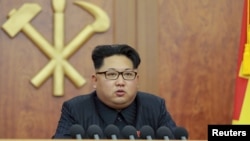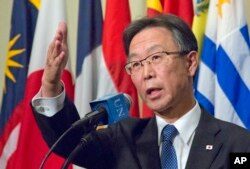North Korea's decision to carry out what it says was its first hydrogen bomb test has already triggered international condemnation, and is likely to lead to tougher sanctions as concern spills across the border into China.
Analysts say the move highlights the growing desperation of North Korea's third generational leader Kim Jung Un and how he is running out of options.
Unstable leadership
Kim, who celebrates his 33rd birthday on January 7, became the isolated country’s leader in late 2011.
Yet the young leader seems largely unable to enjoy the same level of authority his father and grandfather did, says Ding Xueliang, professor of social science at Hong Kong University of Science & Technology who recently made a research trip to Yanbian, a border prefecture between China and North Korea.
Citing estimates by scholars in Yanbian who track the neighboring country’s development on a regular basis, the professor said Kim is put under further test now that North Korea has been hit by a drought and has suffered a huge 20 to 25 percent of food shortage that has pushed its already hungry people below the survival line,
That economic hardship, Ding suspects, may have motivated Kim to risk a provocative move in order to increase his authority domestically and up his bargaining ability with China and South Korea.
“From our ordinary people’s perspectives, that’s not smart. But from his own experience, that’s smart because he does not have many bargaining chips to use on his side,” said Ding.
In Kim’s textbook, his predecessors had succeeded in quite a number of attempts by resorting to the brinkmanship strategies. So, Pyongyang is likely to next negotiate with Beijing for stepped-up supplies of energy, food, machinery and financial aid, the latter of which Kim needs to organize a lavish party congress in May, Ding argued.
'H-Bomb' fallout
But Shi Yinhong, professor of international relations at Renmin University of China in Beijing, disagreed, saying such a threat will only backfire.
“Whether it’s dealing with China or the U.S., Pyongyang knows it clearly that such [provocative] action can only lead to a tougher stance from the U.S. government,” Shi said.
Shi expects the U.N. Security Council to come up with another round of tough sanctions against Pyongyang, which China has no excuse not to abide by.
As to whether China will impose another round of unilateral sanctions as it had done in the first half of 2013 by cutting off energy supplies to North Korea for up to seven months, it’s too early to say, according to the professor.
But no matter how much tougher the sanctions will be, the Security Council will never ask China to completely cut off economic support to North Korea, the consequence of which would be devastating, he added.
It would be more vital for China to sever financial ties, Ding said.
“China now can cut off more financial accounts, that would directly hit the top leaders,” the Hong Kong-based professor said, adding that China should join hands with South Korea to seek a joint sanction as it’s too sensitive for China to team up with western powers as well as Japan.
Tougher sanctions
Calls for tougher sanction against North Korea are growing online and on Chinese social media.
A Weibo user wrote China should “close off its borders, cut off trade exchanges and leave this anti-humanity regime to its self-destruction. The sooner we take action, the more likely we can create a buffer zone.” Another user said “Fat Kim the Third’s action… can only lead to more sanctions, which will put its 22 million poor people into misery. However, as the test site is only 120 km away from China, the nuclear pollution and leak has become the biggest scourge in northeastern parts of China.”
Some, however, put the blame on China itself.
A Weibo user wrote that China cast its vote to join the international community’s sanctions against Pyongyang, “but did China take any solid action?” he asked, adding “appeasement brings disaster. If anyone dies in northeastern provinces, China’s own policies are to blame.”
However, a brief survey on the Sohu website found that 37 percent of respondents believed the United States will take the initiative in imposing sanctions against North Korea while another 36 percent said the U.N. Security Council will. Only eight percent believed China would take the initiative. Although Chinese netizens half believed and half doubted North Korea’s H-bomb test claim, a majority (70 percent) agreed that the tension in the Korean peninsula will intensify.






